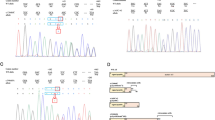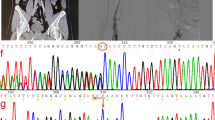Abstract
Inherited antithrombin (AT) deficiency is one of the most clinically significant forms of congenital thrombophilia and follows an autosomal dominant mode of inheritance. We analyzed SERPINC1 in a patient who developed deep-vein thrombosis and low AT activity during pregnancy, and identified a novel missense mutation c.259A>G (p.Asn87Asp; N87D). Surprisingly, analysis of the parents’ DNA showed that they did not possess this mutant, and thus, it may have been due to a de novo mutation. We also expressed this mutant AT protein in COS-1 cells and compared its intracellular localization and intracellular and extracellular antigen levels with that of wild-type AT. The expression experiment did not reveal a significant difference in the antigen levels of the mutant and wild-type AT in the cell lysate, but the mutant AT antigen level was markedly lower than that of its wild-type counterpart in the COS-1 cell supernatant. Immunofluorescence did not indicate any difference between the mutant and wild-type AT in terms of cytoplasmic localization of fluorescence signals. Our findings suggest that the patient’s AT deficiency may have been caused by impaired extracellular secretion of mutant AT protein p.Asn87Asp.





Similar content being viewed by others
References
Perry DJ, Carrell RW. Molecular genetics of human antithrombin deficiency. Hum Mutat. 1996;7(1):7–22.
Jin L, Abrahams JP, Skinner R, Petitou M, Pike RN, Carrell RW. The anticoagulant activation of antithrombin by heparin. Proc Natl Acad Sci USA. 1997;94(26):14683–8.
Olson ST, Swanson R, Raub-Seqall E, Bedsted T, Sadri M, Petitou M, et al. Accelerating ability of synthetic oligosaccharides on antithrombin inhibition of proteinases of the clotting and fibrinolytic systems. Comparison with heparin and low-molecular-weight heparin. Thromb Heamost. 2004;92(5):929–39.
Luxembourg B, Deley D, Geisen C, Spannagl M, Krause M, Miesbach W, et al. Molecular basis of antithrombin deficiency. Thromb Heamost. 2011;105(4):635–46.
Lane DA, Kunz G, Olds RJ, Thein SL. Molecular genetics of antithrombin deficiency. Blood Rev. 1996;10(2):59–74.
Mulder R, Croles FN, Mulder AB, Huntington JA, Meijer K, Lukens MV. SERPINC1 gene mutations in antithrombin deficiency. Br J Haematol. 2017;178(2):279–85.
Sekiya A, Taniguchi F, Yamaguchi D, Kamijima S, Kaneko S, Katsu S, et al. Causative genetic mutations for antithrombin deficiency and their clinical background among Japanese patients. Int J Hematol. 2017;105(3):287–94.
Maruyama K, Morishita E, Karato M, Kadono T, Sekiya A, Goto Y, et al. Antithrombin deficiency in three Japanese families: one novel and two reported point mutations in the antithrombin gene. Thromb Res. 2013;132(2):e118–23.
Chowdhury V, Olds RJ, Lane DA, Conard J, Pabinger I, Ryan K, et al. Identification of nine novel mutations in type I antithrombin deficiency by heteroduplex screening. Br J Heamatol. 1993;84(4):656–61.
Zhou RF, Fu QH, Wang WB, Xie S, Dai J, Ding QL, et al. Molecular mechanisms of antithrombin deficiency in two Chinese families. One novel and one recurrent point mutation in the antithrombin gene causing venous thrombosis. Thromb Harmost. 2005;94(6):1172–6.
Tarantino MD, Curtis SM, Johnson GS, Waye JS, Blajchman MA. A novel de novo spontaneous point mutation (Glu271STOP) of the anitithrombin gene results in a type 1 deficiency and thrombophilia. Am J Heamatol. 1999;60(2):126–9.
Wang TF, Dawson JE, Forman-Kay JD, Kahr WH, Williams S, Chan AK, et al. Molecular structural analysis of a novel and de-novo mutation in the SERPINC1 gene associated with type 1 antithrombin deficiency. Br J Heamatol. 2017;177(4):654–6.
Acknowledgements
The authors would like to thank Dr. Tsuneo Imanaka for providing the pcDNA3.1/AT expression plasmid. This study was partly supported by a grant from the Ministry of Health, Labor and Welfare to E.M. (Grant number 26070201), and grants of the Ministry Education, Culture, Sports, Science and Technology of Japan to E.M. (Grant number 15K08643), A.S. (Grant number 25462818) and H.A. (Grant number 15K19176).
Author information
Authors and Affiliations
Corresponding author
Ethics declarations
Conflict of interest
The authors declare that they have no conflict of interest.
About this article
Cite this article
Kamijima, S., Sekiya, A., Takata, M. et al. Gene analysis of inherited antithrombin deficiency and functional analysis of abnormal antithrombin protein (N87D). Int J Hematol 107, 490–494 (2018). https://doi.org/10.1007/s12185-017-2352-8
Received:
Revised:
Accepted:
Published:
Issue Date:
DOI: https://doi.org/10.1007/s12185-017-2352-8




